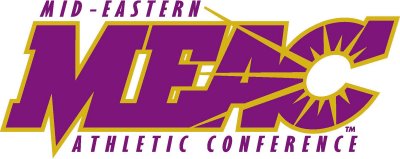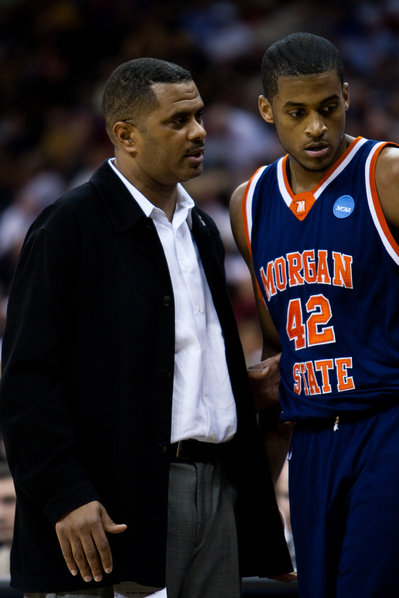RTC Conference Primers: #30 – MEAC
Posted by rtmsf on October 5th, 2010RTC is still seeking a MEAC correspondent. If you are interested in covering this league, email us for further information at rushthecourt@yahoo.com.
Predicted Order of Finish
- Morgan State (13-3)
- South Carolina State (12-4)
- Norfolk State (10-6)
- Delaware State (9-7)
- Bethune-Cookman (9-7)
- Maryland-Eastern Shore (8-8)
- Hampton (8-8)
- Howard (7-9)
- North Carolina A&T (6-10)
- Coppin State (4-12)
- Florida A&M (2-14)
- Savannah State (*provisional member — ineligible for postseason and league awards)
- North Carolina Central (*provisional member — ineligible for postseason and league awards)
All-Conference Team
- CJ Reed (G) — Bethune-Cookman
- Hillary Haley (G) – Maryland-Eastern Shore
- DeWayne Jackson (F) — Morgan State
- Kyle O’Quinn (F) — Norfolk State
- Kevin Thompson (F) — Morgan State
6th Man
- Darnell Porter (G) — South Carolina State
 Impact Newcomer
Impact Newcomer
- Dominique Sutton (F) — North Carolina Central. NCCU isn’t yet playing a complete MEAC schedule nor is it eligible for postseason play this year, but the Eagle program is already making noise on the recruiting trail with the announcement of high-major transfer Sutton returning to Durham to suit up for his hometown team. As of this writing, the 6’5 junior forward who averaged 7.2 PPG and 5.8 RPG as a full-time starter last season for Kansas State was practicing with the team and awaiting an NCAA decision on whether he can play this season. He moved back east to be closer to his girlfriend and two daughters in Durham, and the wing player who terrorizes the glass on the offensive end (especially given his size) will automatically become one of the best players in the MEAC as soon as he is eligible.
What You Need To Know
- All Morgan, All the Time. Todd Bozeman has built a powerhouse in Baltimore to the tune of three straight regular season titles, two straight NCAA bids, and a 46-6 record against MEAC teams the last three seasons. But like all consistently great programs, Morgan doesn’t re-build anymore as much as re-load. From Jamar Smith to Marquis Kately to Reggie Holmes to the next generation (Thompson and Jackson), Bozeman continually has high-mid major talent playing for him. The Bears’ strategy is clear — play a tough non-conference schedule to build up their RPI (beating DePaul, Maryland and Arkansas in recent years), dominate the MEAC, and get back to the NCAA Tournament. Morgan State earned #15 seeds the last two seasons, but they haven’t yet been matched up against the right team in order to pull off the upset — #2 seeds Oklahoma (2009) and West Virginia (2010) were simply too powerful inside for them to handle. Could it come this season?
- Generation Next. Seven of the top ten players chosen to last year’s all-MEAC teams were seniors, so in a sense the next generation of MEAC stars will be on display this season. As a matter of fact, all five players we have chosen to our preseason all-MEAC team are sophomores and juniors. The problem for the rest of the league is that two of those youngsters, DeWayne Jackson (sophomore) and Kevin Thompson (junior), still play for Todd Bozeman at Morgan State.
- Coaching Longevity. One of the benefits of coaching in the MEAC is that there isn’t a huge amount of pressure to win and win right away like many other conferences. Despite only four teams having overall winning records in 2009-10, there is but one new coach in the league this year — Howard’s Kevin Nickelberry — and the average tenure for the remaining ten head coaches is almost seven years (led by Coppin State’s Fang Mitchell and his 24 seasons in Baltimore).
Predicted Champion
- Morgan State (NCAA Seed #15). MEAC Player of the Year and AP all-american honorable mention Reggie Holmes is no longer around, but junior banger Kevin Thompson (12.7 PPG/11.8 RPG) and sophomore forward DeWayne Jackson (10.1 PPG/4.3 RPG) are well poised to pick up the slack. Morgan’s uptempo style of play provides a lot of minutes for a lot of bodies, and Bozeman will undoubtedly find a way to integrate six newcomers into a returning rotation of three talented starters including guard Ameer Ali (4.4 PPG, 4.0 RPG). The Bears succeed by wearing teams down with their numbers, especially on the glass — Thompson in particular was one of the very best in the nation last year on both ends (grabbing 17% of the available offensive boards and 24% of the defensive rebounds). They also look to push the ball in transition and eschew the long bombs in favor of getting into the lane for layups and foul opportunities. With the caliber of athlete that Bozeman continues to draw into the program, the Bears simply have more talent than anyone else in the MEAC. It’ll take a herculean effort by one of the below teams to surpass the Bears in 2010-11, and perhaps for a long time coming unless Bozeman (who received a new contract in the offseason) finally gets scooped up by a bigger school.
Top Contenders
- South Carolina State. SCSU was the only team to truly threaten the Bears’ reign last season, beating Morgan State in Baltimore by three points, losing by five points at home, and dropping a tight one by seven in the MEAC championship game. The Bulldogs lost their star forward Jason Flagler, a first-team all-MEAC selection, but coach Tim Carter returns four other starters, including likely all-MEAC guard Darnell Porter (13.0 PPG, 4.5 RPG) and up-and-comer Khalif Toombs (6.7 PPG/3.5 APG). How SCSU handles the void left by Flagler will go a long way toward determining if they have the horses to challenge Morgan State again.
- Delaware State. DSU rises and falls with its methodical pace and stellar trap defense. Only two teams in America last year played at a slower pace than the Hornets (59.3 possessions per game) and nobody forced more turnovers as a percentage of possessions (28.3%). These two factors keep them in most games against MEAC competition, and Greg Jackson’s team played Morgan State tough two times last year before losing. The bad news is that Delaware State lost its two most productive players, second-team all-MEAC selections Marcus Neal and Frisco Sandidge, and although there is some good young talent returning led by Jay Threatt (the nation’s steals leader in 2009-10), it will take some time to develop.
- Norfolk State. Here’s your MEAC darkhorse. Four starters return from a team that turned around its season starting on February 1 last year. After a horrid 3-16 start to the season, the Spartans ran off eight of eleven losing a double-overtime thriller against Morgan State and two more tight ones to Delaware State and Hampton. The big question mark is how to replace all-MEAC first-team guard Michael DeLoach and his league-leading 21.7 PPG, but Kyle O’Quinn on the inside is ready to explode after a 11.5 PPG/8.5 RPG/1.9 BPG sophomore season. He has considerable help surrounding him, especially the multifaceted guard Rob Hampton (12.4 PPG/4.4 RPG) who can get his shot from just about anywhere on the floor.
Top 5 RPI Boosters
- Nov. 12, 2010 — Florida A&M at Alabama (7 p.m. ET)
- Nov. 26, 2010 — South Carolina State at Clemson (7 p.m. ET)
- Dec. 8, 2010 — Delaware State at Pittsburgh (Time TBD)
- Dec. 20, 2010 — Morgan State at Syracuse (7 p.m. ET)
- Jan. 4, 2011 — Morgan State at Baylor (Time TBD)
Key Conference Games
- Jan. 22, 2011 — Morgan State at Delaware State
- Feb. 14, 2011 — Morgan State at South Carolina State
- Feb. 21, 2011 — Norfolk State at South Carolina State
- Feb. 26, 2011 — South Carolina State at Bethune-Cookman
- Feb. 26, 2011 — Morgan State at Norfolk State
Digging Deeper
Morgan State’s last two seasons sweeping both the regular season and MEAC Tournament titles put the kibosh on a trend where in four of the five previous years (2004-08), the MEAC regular season champion did not win its automatic NCAA Tournament bid. It’s a fact of life in leagues such as this one that only one team will be invited to the Big Dance, but there’s an interesting financial dynamic at play here. If a team like Morgan State in 2009 and 2010 dominates the league so as to earn a #15 NCAA seed (or better), the likelihood of beating a #2 seed in its first game is much greater than knocking out a #1 seed. Conversely, it’s nowhere near the odds of defeating another First Four team (#16 vs. #17 game) yet the financial payout for winning a game — any game — in the NCAA Tournament is equal. So the ideal situation financially from the perspective of the cash-strapped MEAC is for its league champion to be good enough to earn a #16 seed and win its First Four game (thereby earning two game shares for two games played), but not good enough to get placed into the Thursday/Friday second round games against a #2 or #3 seed, where they’re very likely to lose immediately (earning only a single game share).
NCAA Tournament History
The MEAC is a perennial one-bid league, sporting a 3-29 (.094) record in three decades of sending teams to the NCAA Tournament. One of those wins was a preliminary round game in 2004, but the other two (#15 Hampton over #2 Iowa State in 2001; #15 Coppin State over #2 South Carolina in 1997) were major upsets that live on in league lore. With expansion to 68 teams (and three additional at-large teams bumping down the annual MEAC winners), it will be that much more difficult for the MEAC champion to avoid the First Four games of the Tournament. Morgan State’s two consecutive years earning a #15 seed helps to de-stigmatize the league, but the MEAC needs another one of these moments to truly capture everyone’s attention again.
Final Thoughts
The MEAC is a league in transition, as 2010-11 will be the final season with the eleven-team format. Beginning in 2011-12, North Carolina Central and Savannah State will join forces with the rest as the league ultimately desires to reach a fourteen-team configuration. Both schools have shown that they’re planning on taking basketball seriously, evidenced by NCCU’s recruiting of transfers Dominique Sutton (Kansas State) and Ray Willis (Oklahoma) and SSU’s steady progression in recruiting talent since joining D1 five years ago. Additionally, there’s no chance that the MEAC will morph into a two-bid league anytime soon, but if Todd Bozeman can continue to recruit at a higher level than the remainder of this league, he could easily turn Morgan State into the conference’s version of Winthrop (a program that has won nine of the last twelve Big South automatic bids).













































